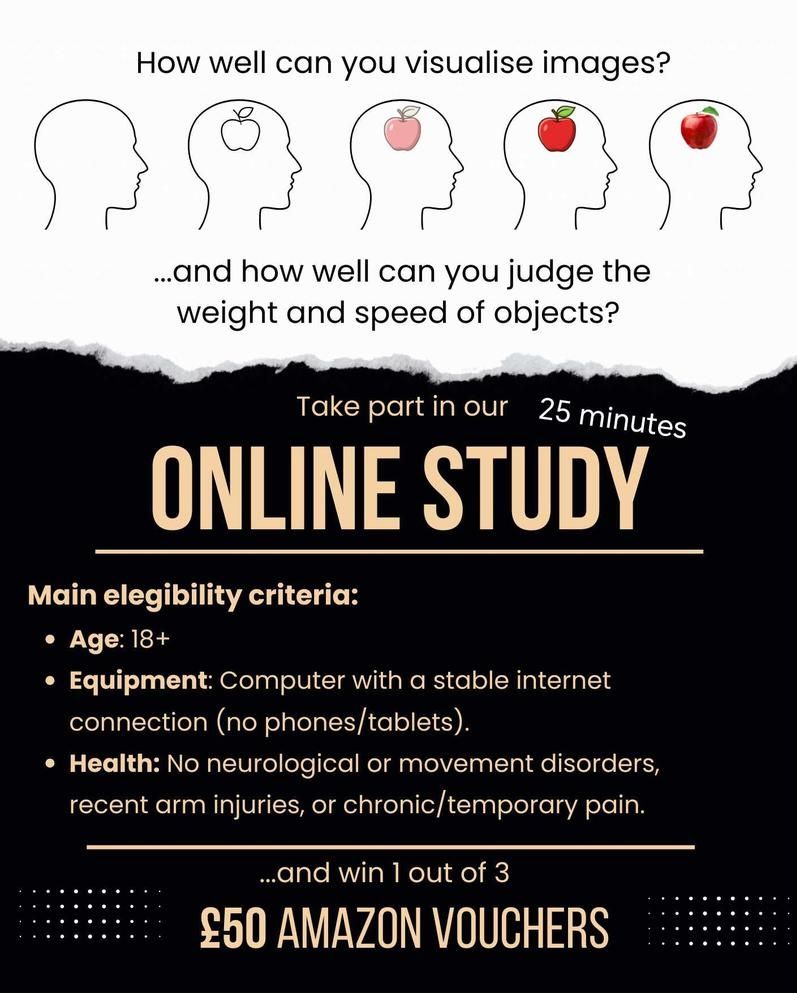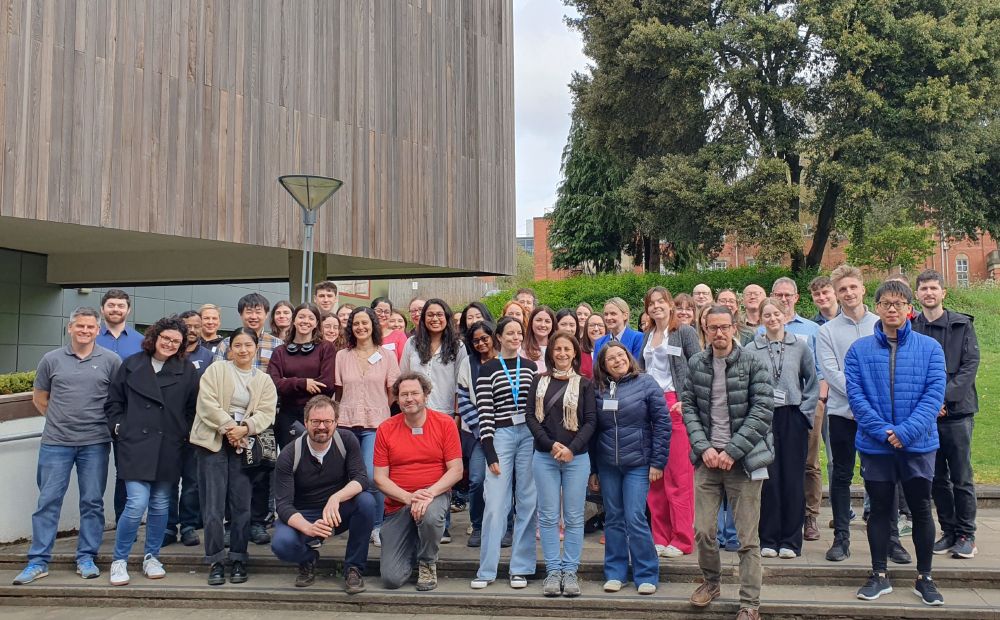Work with 5/6 of my awesome supervisory team ☀️ @jendavies.bsky.social, @drgbuckingham.bsky.social, Chris Chambers, Ezio Preatoni, and Janet Bultitude.
Thanks to gw4biomeddtp.bsky.social and psychologybath.bsky.social
12.12.2025 18:52 — 👍 0 🔁 0 💬 0 📌 0
We hypothesise that the changes in motor system engagement during action observation associated with imagery vividness ('aphantasia') may reflect the extent to which the motor system participates in generating predictions about the observed action, not a necessary mechanism for action understanding.
12.12.2025 18:40 — 👍 0 🔁 0 💬 0 📌 0
We found that neither motor nor general visual imagery vividness predicted action understanding, Bayesian analyses provided moderate to strong evidence for the null hypothesis, and the results were stable across multiple robustness checks/ sensitivity analyses.
12.12.2025 18:28 — 👍 1 🔁 1 💬 1 📌 0
We examined the relationship between this measure and self-reported vividness of visual and motor imagery in an online sample of 392 participants.
12.12.2025 18:24 — 👍 0 🔁 0 💬 1 📌 0
We developed a measure of action understanding, in which participants judged the weight of objects from observing a hand lifting them. Action understanding was indexed by the slope of the relationship between the change in the objects’ actual weights and participants’ precipitation of the weights.
12.12.2025 18:23 — 👍 1 🔁 0 💬 1 📌 0
The question was motivated by past research linking action observation and imagery,e.g., evidence for overlapping neural representation, and by recent work (Dupont et al., 2024), finding an association between imagery vividness and motor system engagement during passive observation of hand actions.
12.12.2025 18:22 — 👍 0 🔁 0 💬 1 📌 0
OSF
Check out our new preprint!! 🤏👀
Motor Imagery Vividness Does Not Predict the Ability to Judge Object Weight from Observed Hand Actions
doi.org/10.31234/osf...
We explored the relationship between the ability to understand hand actions and self-reported motor/general visual imagery vividness.
12.12.2025 18:21 — 👍 2 🔁 0 💬 2 📌 1
Now published in the Journal of Neurophysiology:
journals.physiology.org/doi/full/10....
Get in touch if you think this tool could help in your science! We will be developing improvements and extensions over the next year.
12.12.2025 14:57 — 👍 42 🔁 18 💬 1 📌 0
@gw4biomeddtp.bsky.social @psychologybath.bsky.social @drgbuckingham.bsky.social @jendavies.bsky.social
12.12.2025 12:43 — 👍 0 🔁 0 💬 0 📌 0

Are you someone, or do you know anyone, who has pain in their arm/hand/shoulder (for any reason) and would be interested in contributing to ONLINE research on movement perception in upper limb pain?
Participate/find out more here: run.pavlovia.org/Szekely/unil...
12.12.2025 12:41 — 👍 1 🔁 2 💬 1 📌 0
Today at 14:00 GMT
👀🧠🧲⚡️
28.11.2025 06:11 — 👍 5 🔁 3 💬 0 📌 0
Who wants to be a postdoc in Cardiff?
Great place, great looking project, fantastic PI✨
31.10.2025 21:26 — 👍 1 🔁 1 💬 1 📌 0
Thank you for the update, it's pretty! Would it be possible to do something about the loading times?
24.10.2025 13:06 — 👍 0 🔁 0 💬 1 📌 0

TMSMultiLab survey
TMSMultiLab is a community of ~70 researchers using transcranial magnetic stimulation (TMS). We aim to share methods code and data, to reach consensus & encourage best practice in TMS research methods...
To find out about how #TMS #BrainStim users collect, analyse & share their data, we've made a very brief TMS survey:
forms.gle/83Abpj5F8qzd...
It should take you less than 5 minutes & does not ask for any personal information.
We'll use the answers to plan our future work.
Please share!
🙏🙏🙏
⚡
10.10.2025 11:33 — 👍 7 🔁 11 💬 0 📌 3
Friday is a big day for the TMS-RAT🤩
24.09.2025 17:39 — 👍 6 🔁 2 💬 0 📌 1
This fall I will have a blind student in my coding class for the first time. Do any other instructors or visually impaired coders have advice beyond making sure my book has useful alt-text for the images? #rstats #accessibility
Class book: psyteachr.github.io/reprores-v5/
16.09.2025 09:54 — 👍 26 🔁 35 💬 6 📌 1
Thanks :))
16.09.2025 20:18 — 👍 0 🔁 0 💬 0 📌 0


Had a wonderful time at #BACN last week. I’m very grateful for all the in-depth discussions, and so excited that our project with @mmarneweck.bsky.social was awarded the poster prize 🏆
15.09.2025 12:29 — 👍 6 🔁 1 💬 1 📌 0

We're now up to 29 labs across 16 countries for our replication project! There is still room for more labs to join us. We are particularly seeking labs capable of testing native English speakers, though all labs are welcome to participate. For more information: rolfzwaan.substack.com/p/memory-mis...
11.09.2025 08:36 — 👍 2 🔁 4 💬 2 📌 1
A huge thank you to @mmarneweck.bsky.social for hosting me and to @gw4biomeddtp.bsky.social for making this opportunity possible.
10.09.2025 11:43 — 👍 2 🔁 1 💬 0 📌 0
This year, I spent March–June at the University of Oregon, working with @mmarneweck.bsky.social on an fMRI analysis of the representational pattern similarity of lip and hand movements after upper-limb amputation.
Excited to share this at #BACN25 ✨ Find me at the datablitz/poster sessions on Friday!
10.09.2025 11:42 — 👍 10 🔁 5 💬 1 📌 0

EPSRC Hub for Quantitative Modelling in Healthcare | EPSRC Hub for Quantitative Modelling in Healthcare | University of Exeter
I previously got responses (and eventually found a wonderful mathematician collaborator) to a similar query from the HUB of Quantitative Modelling in Exeter
www.exeter.ac.uk/research/qua...
10.09.2025 09:52 — 👍 1 🔁 0 💬 0 📌 0
Over the last few months, members of TMSMultiLab have read, analysed & assessed #TMS research papers to produce a new tool:
17 people
333 papers
80 criteria
2 raters per paper
The dataset contains 53,280 ratings!
It's an immense piece of work, the first empirical contribution of TMSMultiLab...
☺️
15.08.2025 15:18 — 👍 5 🔁 4 💬 1 📌 0
The *final* stage of the TMS-RAT 🐀 v1.0 is happening... data are being compiled. 😬...
#TMS #BrainStim #SystematicReview
tms-rat.org
06.08.2025 11:26 — 👍 7 🔁 3 💬 0 📌 0
New preprint out, where we show that TMS-induced pupil dilations can be used as a measurable proxy of cortical excitability.
With:
@frasermacrae.bsky.social
@freekvanede.bsky.social
@daspainbrain.bsky.social
@drsmschabrun.bsky.social
et al.
Details below 🧵 [1/n]
03.08.2025 14:04 — 👍 10 🔁 4 💬 2 📌 2
For TMS studies to be reproducible and for us to build on each other’s findings, we need to report what we actually did during the experiment.
We've built and now are evaluating the TMS-RAT (Reporting Assessment Tool).
Check out our website! - built by @thehandlab.bsky.social
07.06.2025 19:29 — 👍 5 🔁 2 💬 0 📌 0
You kind folks in my tiny network – would love it if you could repost!
13.05.2025 00:33 — 👍 0 🔁 0 💬 0 📌 0
This study will involve 1) answering some questions about yourself and how you visualise images, and 2) watching videos of objects that are moved by different means and making simple judgements about them.
13.05.2025 00:16 — 👍 0 🔁 1 💬 1 📌 0

𝐂𝐚𝐧 𝐲𝐨𝐮 𝐣𝐮𝐝𝐠𝐞 𝐭𝐡𝐞 𝐰𝐞𝐢𝐠𝐡𝐭 𝐚𝐧𝐝 𝐬𝐩𝐞𝐞𝐝 𝐨𝐟 𝐦𝐨𝐯𝐢𝐧𝐠 𝐨𝐛𝐣𝐞𝐜𝐭𝐬?
We're running a ~20-min study on visual imagery & movement perception. Your participation would really help, and you can enter a prize draw to win one of three £50 Amazon vouchers.
Participate/find out more: run.pavlovia.org/Szekely/acti...
13.05.2025 00:16 — 👍 2 🔁 1 💬 1 📌 0


Happy 40th Birthday #TMS 🥳🧲🎈
Published in the Lancet on 11th May 1985, a 1-page report of a new device & the 1st TMS-evoked MEP changed brain stimulation research & treatment forever
We celebrated with Professor Barker two weeks ago in Birmingham
Here's to 40 more years!
doi.org/10.1016/s014...
11.05.2025 16:58 — 👍 8 🔁 4 💬 1 📌 1
Methods Nerd │ PCI RR Recommender
Dev Cog Neuroscience │Disability Research
Assist Prof
Open Science Coach
Linköping University 🇸🇪
Views my own
How do we move? I study brains and machines at York University (Assistant Professor). Full-time human.
Neural Control & Computation Lab
www.ncclab.ca
I make stuff sometimes!
when i’m not blacksmithing, i shepard a research engineering team at apple
Read the BBS article: "Core Perception", Dawei Bai e.a.
It captures exactly the paradigm shift that underlies my entire research program — the very shift I have spent the past decade trying to implement.
https://www.researchgate.net/profile/Nj-Mol/research
The British Psychological Society's magazine, born in 1988, available in print for members, online and app.
http://www.bps.org.uk/psychologist
Posts/views: Editor Dr @jonsutton.bsky.social and Deputy Editor @jennifergledhill.bsky.social.
Lecturer (Asst Prof) & researcher in Psychology & Neuroscience, QMUL, Karolinska Institutet & UCL.
Touch, temperature, interoception, body perception, mental health.
Secretary of @escaneu.bsky.social - Chair SBBS WHENetwork
www.lauracrucianelli.com
Our mission is to increase openness, integrity, and reproducibility of research.
Lecturer at the University of Bath researching the effects of leading by example with low-carbon behaviour. Particular interest in politicians, celebrities & CEOs.
Professor, Western University, Canada 🇨🇦
https://www.gribblelab.org
he/him
Official account of the Department of Psychology at the University of Bath.
Follow us for updates on events, research, & opportunities!
Cognitive psychologist 🧠 | Working in Academia and Industry👩💻 | Science Officer opensciencetools.org (creators of @psychopy.org)🔓 | Post doc multisensorytcd.com (studying Multisensory Perception 👀👂) | Obsessed with my dog 🐶 Trying to handstand 🤸
Sleep, Plasticity, And Conscious Experience (SPACE) Lab
IMT School for Advanced Studies Lucca
Lucca, Italy
INSERM scientist in Grenoble; perceptual consciousness and metacognition with invasive electrophysiology and single neuron recordings (in humans); http://mpereira.me
https://bids.neuroimaging.io/
www.hunterschone.com
Assistive technologies and neuroplasticity | NIH BRAIN Initiative postdoctoral fellow in the Collinger lab at the University of Pittsburgh | Prev: UCL and NIMHgov | 🏳️🌈
Assistant professor @utrechtuniversity.bsky.social studying spatial attention, eye-movements, pupillometry, and more. Co-PI @attentionlab.bsky.social
Scientist attempting to understand pain 😖 temperature 🔥❄️ & attention 👀 in the human brain 🧠
In my spare time: 🐕🥊🧘🏻♀️🏃🏻♀️ & 👩🏻🎨
Brit in Denmark. She/her
🧠 Postdoctoral Researcher @ University of Oxford
Chronic Pain ~ Neuroimaging ~ Neurodivergence ~ Open Research ~ Multisensory Integration
Lecturer at the University of Surrey. 🧠 Motor control 🤏 Multisensory integration 🧒 Development - Body representations - Dyspraxia - Autism
Lecturer in Psychology at Bath Spa | Researcher of bystanders, GBV and filmed VR | Researcher Wellbeing Group Founder | She/her | Views my own








